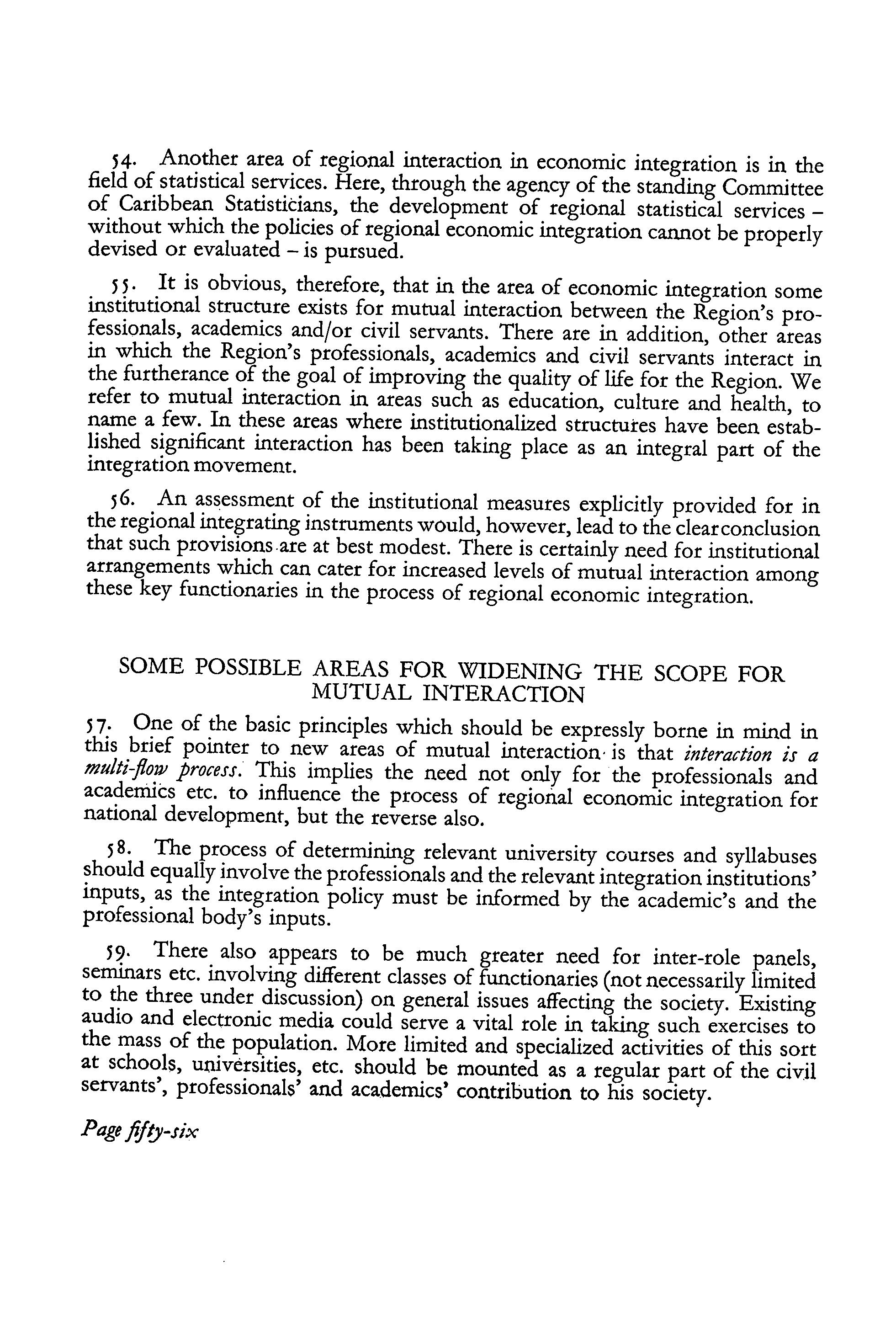
35 minute read
Annex C - Address by Mr R. Steel
54. Another area of regional interaction in economic integration is in the field of statistical services. Here, through the agency of the standing Committee of Caribbean Statisticians, the development of regional statistical services - without which the policies of regional economic integration cannot be properly devised or evaluated - is pursued. It is obvious, therefore, that in the area of economic integration some institutional structure exists for mutual interaction between the Region's professionals, academics and/or civil servants. There are in addition, other areas in which the Region's professionals, academics and civil servants interact in the furtherance of the goal of improving the quality of life for the Region. We refer to mutual interaction in areas such as education, culture and health, to name a few. In these areas where institutionalized structures have been established significant interaction has been taking place as an integral part of the integration movement. 6. An assessment of the institutional measures explicitly provided for in the regional integrating instruments would, however, lead to the clear conclusion that such provisions are at best modest. There is certainly need for institutional arrangements which can cater for increased levels of mutual interaction among these key functionaries in the process of regional economic integration.
SOME POSSIBLE AREAS FOR WIDENING THE SCOPE FOR MUTUAL INTERACTION 7. One of the basic principles which should be expressly borne in mind in this brief pointer to new areas of mutual interaction is that interaction is a multi-flow process. This implies the need not only for the professionals and academics etc. to influence the process of regional economic integration for national development, but the reverse also. 8. The process of determining relevant university courses and syllabuses should equally involve the professionals and the relevant integration institutions' inputs, as the integration policy must be informed by the academic's and the professional body's inputs. 59. There also appears to be much greater need for inter-role panels, seminars etc. involving different classes of functionaries (not necessarily limited to the three under discussion) on general issues affecting the society. Existing audio and electronic media could serve a vital role in taking such exercises to the mass of the population. More limited and specialized activities of this sort at schools, universities, etc. should be mounted as a regular part of the civil servants', professionals' and academics' contribution to his society. Page flf1y-six
Advertisement
6o. There is also dire need for professionals and civil servants etc. to be able to return for short sabbaticals to academic institutions, and for interchange with academics so as to give each other a deeper appreciation of the position of the others. Similarly, academics should be allowed to, and should avail themselves more of opportunities to be attached to regional and national institutions as a means of providing vital refresher inputs and of appreciating critical practical difficulties of having to functiOn in certain positions. The Universities must also provide for senior retired outstanding political, academic and professional figures to contribute to the enrichment of the institutions, and through them, the society by catering for such contributions as they may be able to make in their later years. Finally, at the level of the integrating Institution, formal machinery ought to be devised for providing for discussions between regional policy makers, professional bodies and academics so as to constantly enrich the movement through person-to-person contact between the Region's key resources - its skilled personnel.
CONCLUSION
Advocacy of the ideas expressed in the preceding section is however inhibited by one strong factor. It must be recognized that in the final analysis, the degree of effective mutual interaction is likely to be not so much a function of legal provisions as of the spirit with which the whole process of integration, be it for national or regional development, is pursued. This in itself depends in large measure on the role which professionals and their corporate bodies, academics and the universities, and governments and their officials see each other as playing within the society. Universities must remember that they are not the Government, academics that they are not minister and politicians, governments and politicians that they are not university vice chancellors and professors, and civil servants that they are public servants. They must all recognize that each is poorer without the proper relationship and functioning of the other; and, most importantly, that the countries of the Region cannot sustain these elites, as indeed they are, unless by such sustenance they ensure the rapid development of all the people. Indeed their failure to do this might raise the question of the role of yet another class of functionary not so far considered - the military. But this is another question for another time! Sir Hugh Springer in a graduation address at the Cave Hill campus a few years ago made the following comment -
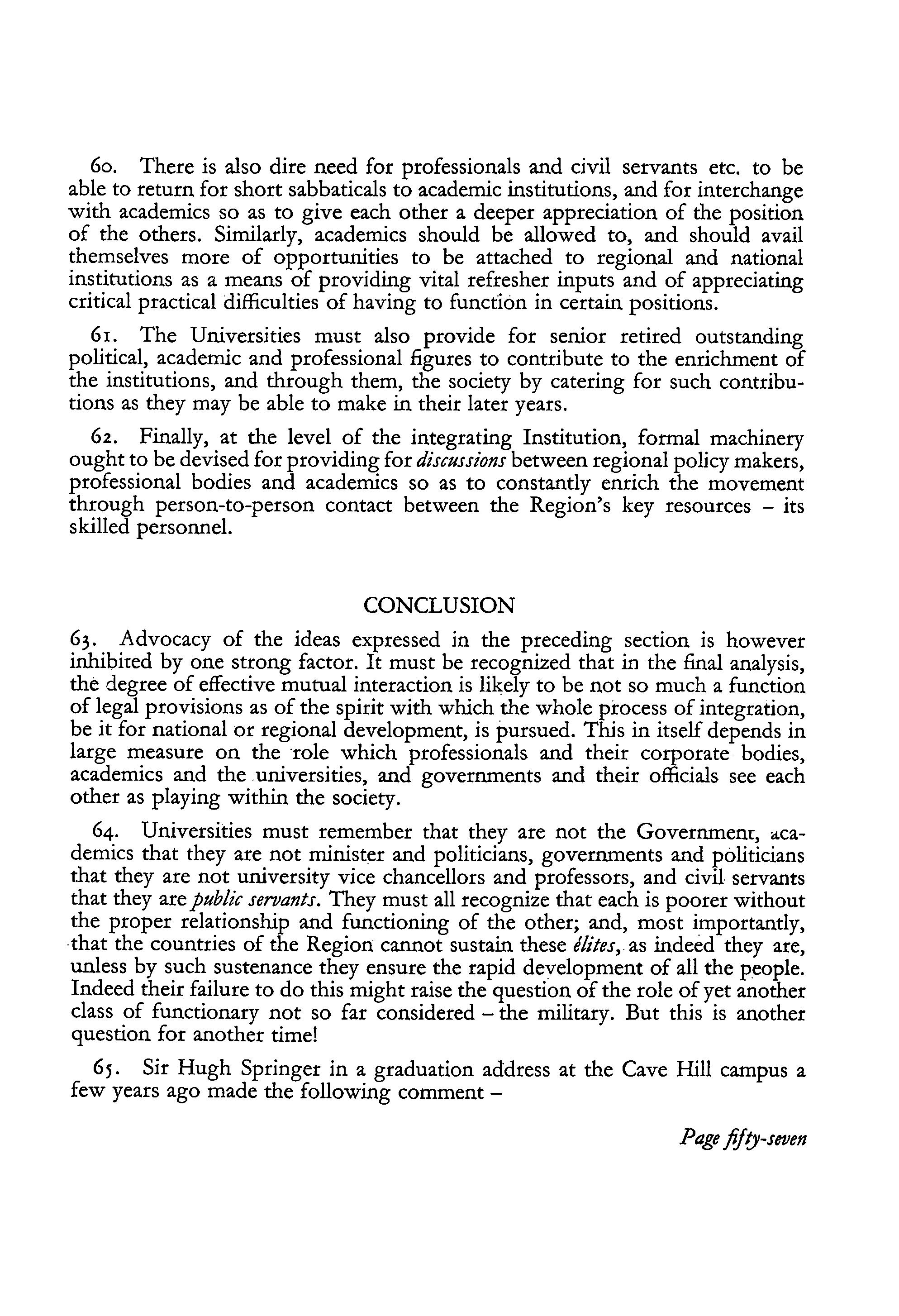
Page fiftji-seven
'...there is a limit to what Governments and Statesmen can do. In a democratic society the quality of Governments reflect the quality of the people who elect them and who must bear the ultimate repsonsibiity for what they do. And the quality of a people is determined by the quality of the individuals who make it up." 66. The Commonwealth Caribbean is a democratic society. Professionals, academics and civil servants are important elements in this society.
ANNEX C
THE PROFESSIONS AND THEIR CONTRIBUTION TO OPINION FORMING AND NATIONAL POLICY MAKING
By Robert Steel, B.Sc., FRICS, Barrister at Law (Secretary of CASLE)
i. INTRODUCTION 1.1. The Commonwealth Heads of Government established the Commonwealth Foundation in 1966 with the object of promoting the advancement of the professions in all Commonwealth countries. They had in mind that professional skills are needed to achieve social and economic progress and for the realization of national development plans'; and their aim was to help every country of the Commonwealth to acquire indigenous skills of the quality and on the scale that its local needs required. 1.2. In its turn, the Foundation has sought to improve the supply of professional manpower and the standard of professional competence by sponsoring three main forms of activity - (i) the formation of Commonwealth Associations for individual professions (which facilitates pan-Commonwealth collaboration), (ii) the formation of national professional centres (which facilitates collaboration between all the professions in individual countries), and (iii) various promotions in the form of bursaries and grants designed to foster professional development, the provision and improvement of professional education, and the dissemination of professional information. 1.3. This conference reflects a further important advance in the Foundation's thinking. It has recognized that the mere provision of professional skills is not enough; and that it is equally important to ensure that those skills are properly and fully used. The subject-matter of this conference has evolved out of earlier discussions on the role of the professions in a changing world, and on the complementary role of the universities; and the realization that the best
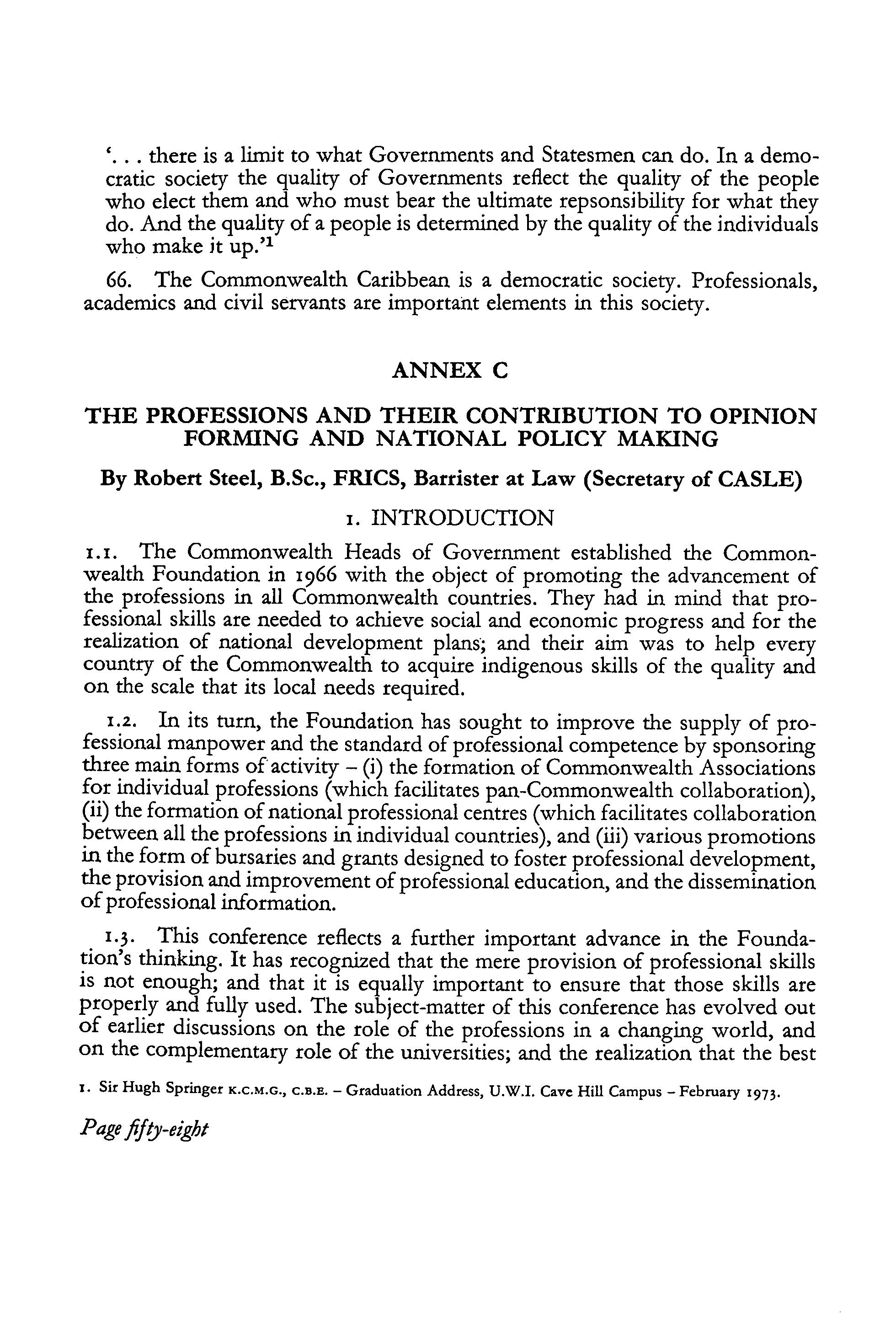
i. Sir Hugh Springer K.C.M.G., C.B.E. - Graduation Address, U.W.I. Cave Hill Campus - February 1973.
Page fiff.y-e:ght
results will only be achieved if these two reservoirs of experience and skill can be harnessed to the national effort by working in close accord with the civil service, both in the performance of professional work and in the provision of advice on the framing of national policies and the implementation of national plans. 1.4. I can say from my own experience that some countries make good use of their professional resources, but in many. others there is a considerable lack of understanding by governments. and public servants of the actual. functions of the professions and of the role they can play in the advancement of the- public well-being. It is important to recognize, in such cases, that governments will only be able to make full use of the professions if the professions themselves make a positive and successful effort to convey to those who make policies a clear picture of the services they have to offer. This need is not, I may say, limited to the developing countries, where some of the professions are-comparatively new; the lack of understanding is equally apparent in some of the developed countries. I speak not so much of the better known professions such as law and medicine, but rather of those that are less well known to the general public, and in particular the environmental professions of architecture, engineering, planning, surveying and land economy. 1.5. CASLE (or the Commonwealth Association of Surveying and Land Economy, with which I have the honour -to be connected) has endeavoured to overcome this problem by publishing literature about the scope of its three constituent professions (land economy, land surveying and quantity surveying) and the services they are able to offer. It has also sponsored seminars in several countries for discussions with governments, the civil service and the universities, designed to cultivate a better understanding -all round, and to foster the academic provision that is needed both to produce professional manpower and to offer opportunities for research. I have to confess that this is occasionally uphill work, especially where the wish to inform and to help is misconstrued as an indulgence of self-interest by the profession itself. 1.6. The Commonwealth Associations sponsored by the Foundation are a little more altruistic than that. Indeed, no profession is worthy of the name unless it has a positive desire, and takes positive steps, to contribute to human progress. A professional organization exists to serve the public as well as to serve its members. A national professional society provides a focal point for corporate activity, acts as the pace-maker in advancing professional skills, and serves as the channel through which the profession collectively places its experience and its advice at the disposal of governments. In the UK, the leading professional bodies work closely with government in all fields and it is my hope that this state of affairs also exists elsewhere, or - if not - that it will do so in
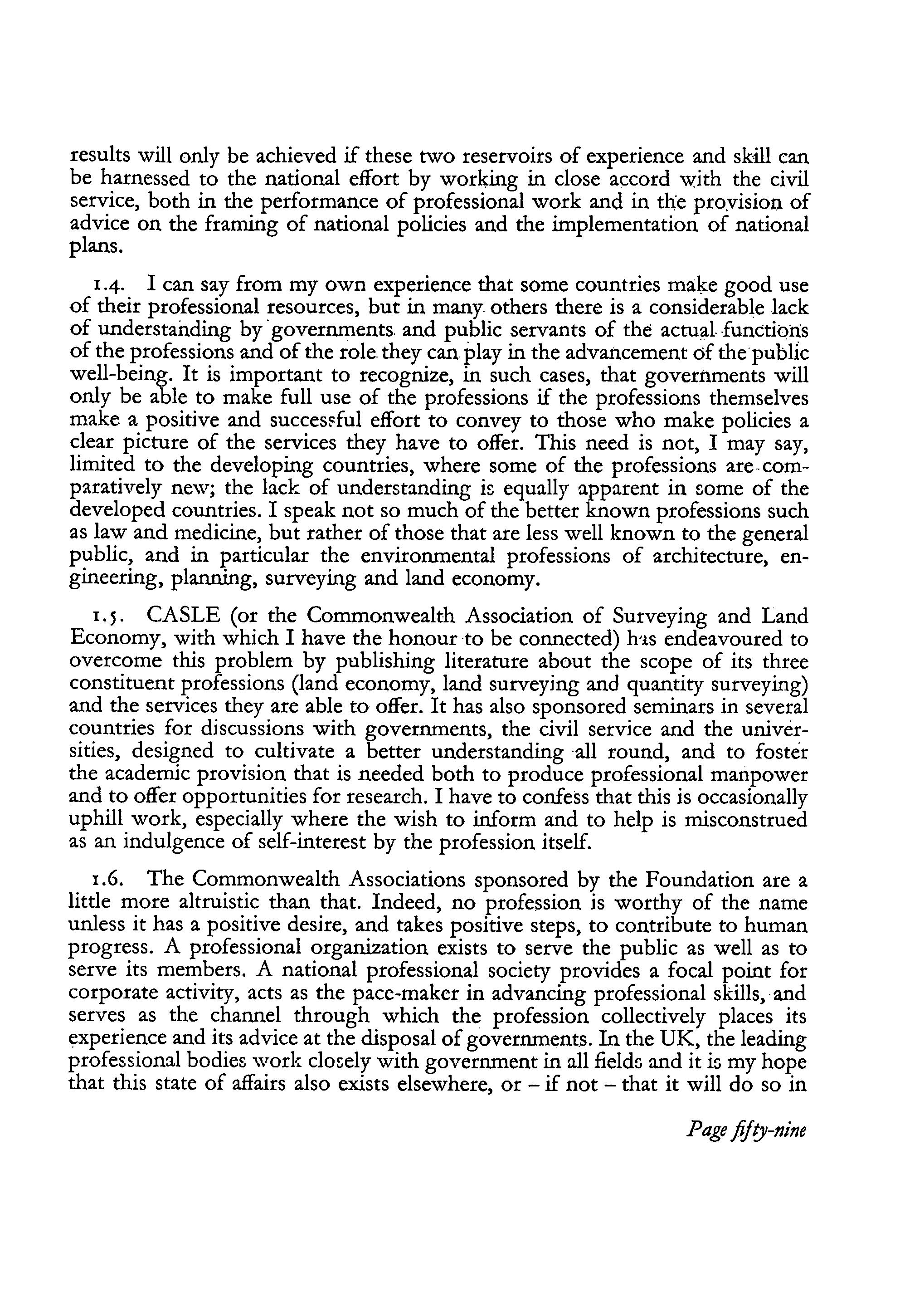
Page fifty-nine
future, encouraged by events such as this conference. For that reason, among others, the conference could be an important milestone in developing the role of the professions in Commonwealth countries. 1.7. It may be relevant to observe, at this point, that in the modern world there seems to be an infinite number of vocations that aspire to be professions; To spare myself the task of attempting any precise and comprehensive definition, I adopt for my present purpose the proposition in the .Oxfo.rd English Dictiona.ry that a profession is. 'a vocation' in which a professed khowledge of some department of learning or science is used in its application to the affairs of others;' to which Sir James Currie added (in 'Professional Organizations in the Commonwealth') three specific characteristics, namely, that (i) terms of entry to the profession should be well defined, (ii) the profession imposes a discipline on its members, and (iii) before a member of the profession can 'practise he may have to submit his qualifications to-some statutory or authoritative body. Even if it were possible to identify every vocation that possesses these attributes, I could not claim to speak for all of them; and I shall limit myself to those principally concerned with the physical environment - or with the availability, ownership, use and development of land. 1.8. May I add, by way of further preamble, that these professions do not stand apart from the rest of society. They are, of course, distinguishable groups which have acquired special skills; and their codes of ethics occasionally give the impression that they aspire to,a monopolistic elitism; but the motivation of the true professional can only be to advance his skills and competence in the service of society, and to follow codes and ptactices which serve that purpose. It might also be inferred ,from the theme of this conference that the civil service, ,the universities and the professions operate as entirely separate entities. In fact, many people trained in the professions work in the civil service, and many others work in the universities; which helps to in the efforts of all three sectors.

2. THE ENVIRONMENTAL PROFESSIONS 2.!. The environmental professions are concerned with the circumstances in which people live, which in turn have a bearing on the social structure and patterns of human behaviour which interest many other professions as well. But the use that is made of land, and the developments that take place upon it, are important economically as well as socially; so the professions to which I refer have a central role to. play. in a 'wide range of human activity. They are concerned with national and regional planning, with development policies and their implementation, and with the protection and improvement of the environment. In their day-to-day work, land surveyors produce the maps that are essential for the identification and exploitation of all natural resources; Page six*
engineers and surveyors provide the infrastructure required for all forms of development; planners, surveyors and architects are concerned with the planning of land uses and the construction of buildings; while surveyors skilled in land economy are concerned with the viability of what is planned, with the mechanisms that bring about its fulfilment, and with the overall management of land resources. National progress depends on making use of all these skills. 2.2 The environmental professions, of course, would not claim the omniscience needed to solve all the problems that beset society. They are but part of a greater team which comprises sociologists, economists and a host of others. Like society itself, they also have to cope with the rapid expansion of scientific and technical knowledge, the increasing pace of technological innovation, the phenomenal growth in world population, and the changing aims and aspirations for which society is striving. Their work therefore has an ever-changing novelty about it. Paradoxically, technological advance seems to be accompanied by a growing scepticism about the validity of long-term predictions and projects, and about many of the elaborate studies and techniques that have pervaded planning and development in recent years. Aspirations for economic growth and material wealth are being tempered by a realization that these do not necessarily mean an increase in human satisfaction, and by a greater interest in the quality of life itself. Indeed the techniques of evaluating the quality of life factor in development decisions are still in an embryonic state; and society is still struggling to find new philosophies and policies for making the best use of land, for conserving natural resources, and (of special interest to this conference) for improving the social and economic circumstances of the less prosperous countries of the world. In this evolving situation, the matters with which the environmental professions are concerned are inevitably the subject of public debate and controversy, which means that professional knowledge and understanding of the problems are important factors in assisting the public to reach conclusions on the basis of well-informed opinions. 2.3. In most developing countries, society establishes its objectives and expresses its priorities through a national development plan. We are concerned here with provisions in the plan for the development of agriculture, forestry, minerals, water resources, industry, commerce, housing and social provision, and for orderly urban growth. Government (or the civil service on its behalf) will no doubt seek - from its own advisers, the universities or elsewhere - the best scientific advice on the policies that are necessary to increase food production or to ameliorate the social fabric through a programme of urban improvements. This is sometimes all the advice they do take, but it is not enough. Social and economic policies which depend for their success on the appropriate use of land and natural resources, will need to be based upon sound land policies, the provision of necessary infrastructure, the availability
Page sixtj/-one
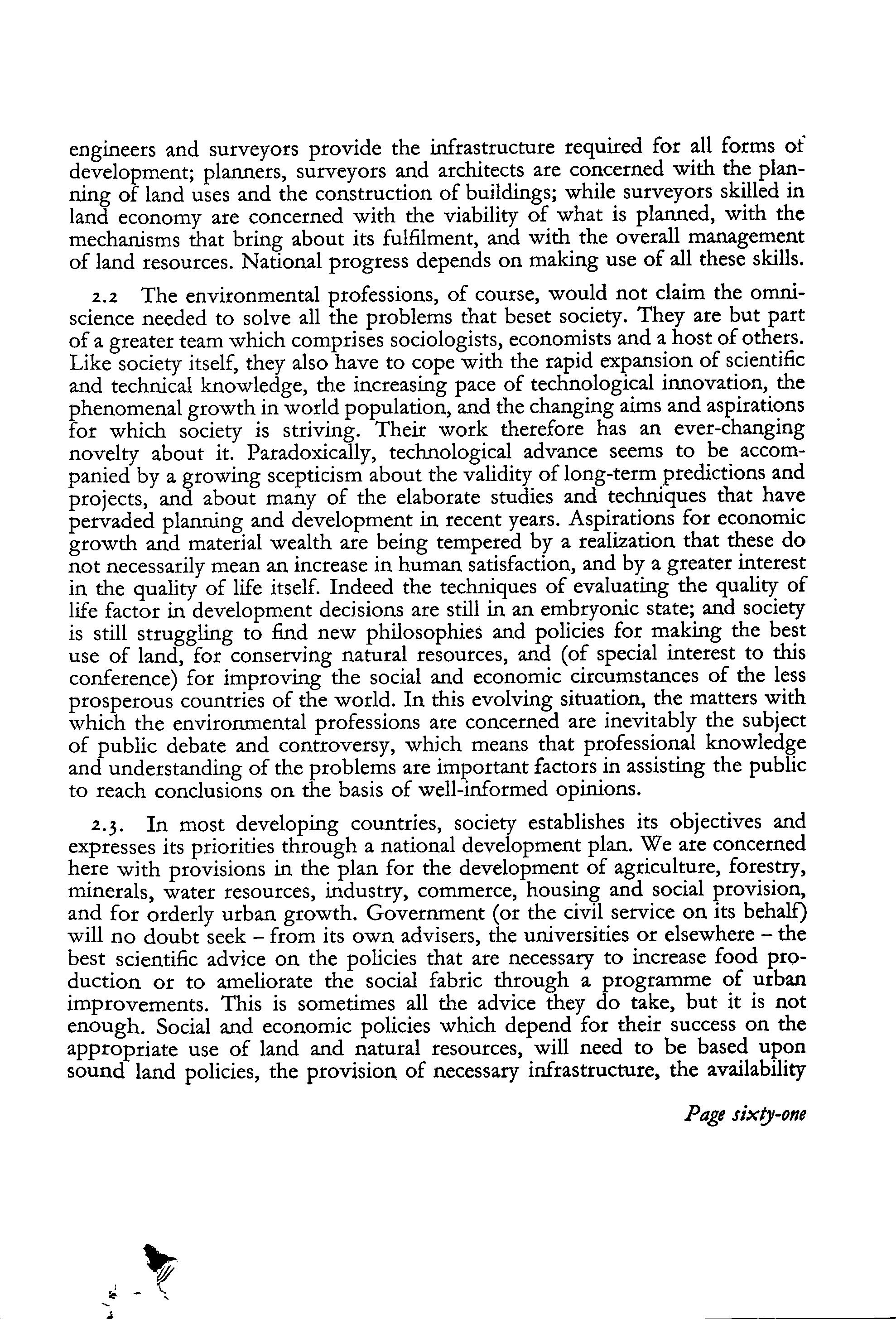
of' development finance, and the existence of an effective development organization. Policy-making and implementation must be planned as one operation; and it is therefore important, at the policy-making stage, to achieve maximum involvement of those professions that will be responsible for implementing what is contemplated. It is also important to ensure that the necessary skills are available to carry through what the plan provides. A large dam which encloses the water supply for a power station is not merely an engineering project for generating electricity; it may inundate large areas of land that have hitherto provided homes and agricultural occupations for thousands of people who have to be resettled; it will almost certainly involve the acquisition or control of a much larger catchment area for which land use policies will be needed; and the project will therefore necessitate skills in land management, land resettlement and possibly also land reform. The same would apply to many other projects - such as new settlement porgrammes under the land ceiling and land reform policies of India and Sri Lanka, or the large irrigation schemes at Lake Chad and elsewhere. 2.4. May I therefore repeat that there must be a greater public awareness of the services which the professions can provide and of their relevance to national needs and aspirations. There is a need also to make adequate provision of facilities for education and training where these are lacking or inadequate. The omission of this provision is an all-too-common feature of national development plans; and this is one of the areas in which collaboration between governments, universities and the professions is absolutely essential. Only recently, in a conversation I had with the Minister responsible for one of the most comprehensive national plans in the Commonwealth, which involves a massive programme of land development, he conceded that the manpower provision for carrying it into effect took no account of people trained in surveying and land economy because the significance of their role had not been appreciated at the time when the plan was prepared. This was, of course, a failure on the part of the professions themselves, as much as of those who prepared the plan. z.y. Given, however, that the necessary skills can be secured, what are society's main objectives likely to be? In a country where standards of living are below average, it is natural to aim at a raising of standards through investment and economic growth. Schools, factories and houses are likely to be high on the list. The need to employ skills in town planning and the design of buildings may be self-evident; but, all too often, no use will be made, for example, of the quantity surveyor whose job it is to ensure that value is obtained for the money invested. By timely cost advice and by cost controls throughout each project, the quantity surveyor can effectively reduce the cost of buildings, as he has helped to do with quite dramatic results in the school building pro- Page. sixty-two

gramme of the United Kingdom. In most countries, construction works account for more than 50 per cent of fixed capital formation; and, as there is never enough money to go round, it is obviously important to achieve the best use of resources by choosing projects which confer the greatest benefits, by choosing designs that are most economic, and by adequate financial forecasting and administration. Savings of even 5 per cent on construction expenditure would enable many more schools, factories or homes to be provided. 2.6. The development of individual projects must also conform to wider land use policies. Physical planners sometimes see their tasks as an exercise solely in three dimensional design, to the exclusion of economic considerations; but no physical plan will succeed, or even be taken seriously, if it undermines the national economy. At all stages, therefore, physical planning must be integrated with economic and financial planning, and must take account of all considerations, including the means whereby what is planned can in fact be implemented, whether by state intervention and initiative or by facilitating and encouraging private action and enterprise. 2.7. In virtually every country, the so-called land problem is also central to the process of development. Historically, governments have interfered increasingly with the traditional rights of owners to use and develop their properties. Some curtailment of private freedom is necessary to achieve effective control of the environment, to improve living and working conditions, and to facilitate public works. Modern society would be unworkable without some powers of public control and expropriation of private interests; and in some countries the public debate has even moved on to discuss the acquisition by the state of all land, or at least of land required for development. At the same time, private ownership - whether by individuals or by various forms of private institutions, including the concept of the extended family - is still a linchpin of the social structure - in a great number of countries. 2.8 It will be clear from the foregoing that the environmental professions inevitably come face-to-face with important public issues, on which their professional skills and experience make them particularly competent to advise. From their day-to-day work they can identify and anticipate problems of public concern and contribute to their solution. They can, of course, only help government in areas for which government accepts responsibility, but in almost every country this includes responsibility for the environment, and for land use and development policies. There is little doubt, however, that to achieve necessary environmental improvements, a great expansion of knowledge is needed, and this will only be possible through close collaboration between the professions and the universities in identifying matters for research, and in the development of new techniques. This need is particularly acute in Page sixty-three
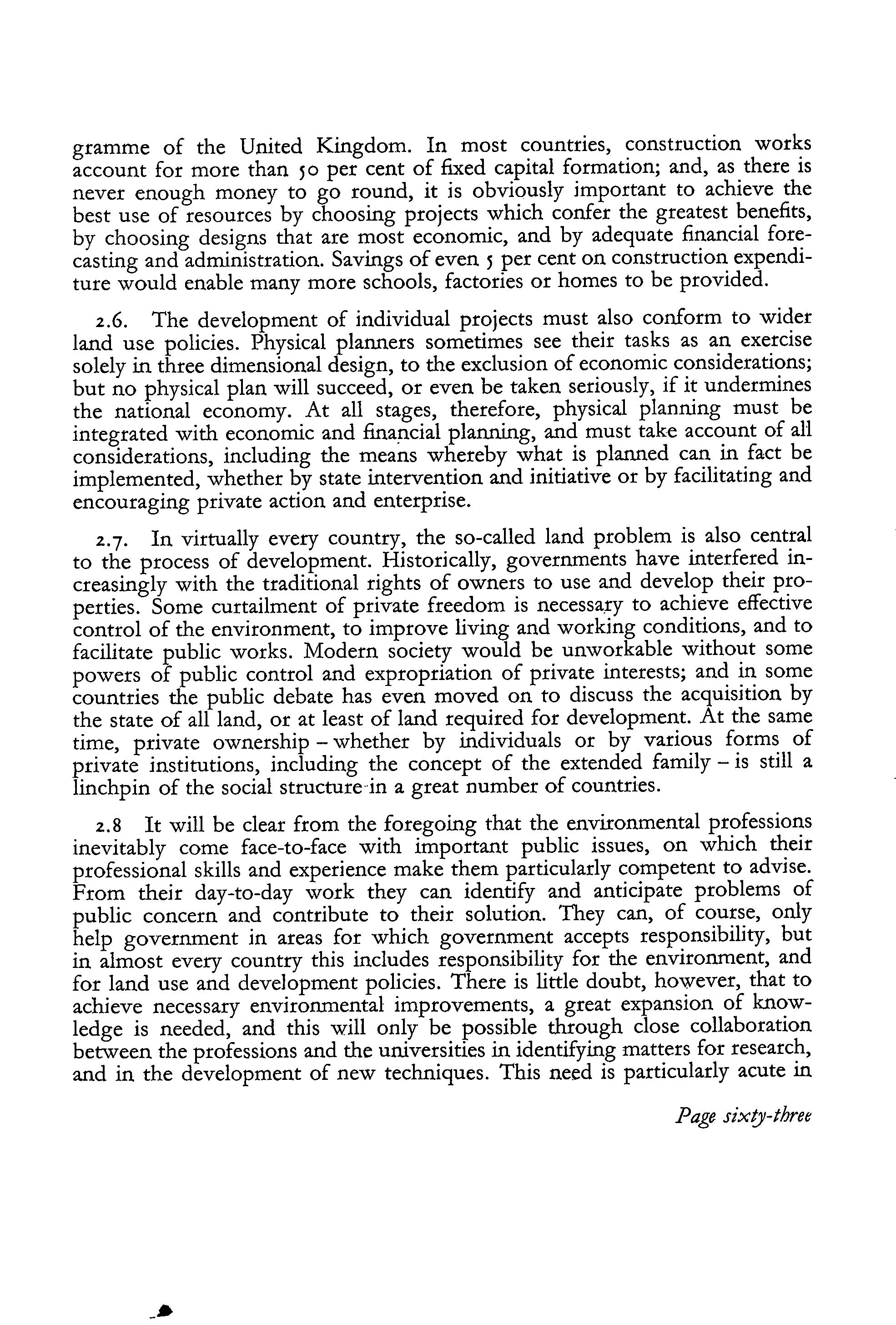
developing countries where skilled manpower is still in short supply, and where certain disciplines are so new to the academic world that there has been little opportunity so far to promote research and the academic expansion of the discipline in relation to local needs.
SOME EXAMPLES OF INFLUENCE ON OPINIONS AND POLICIES 3.1. It may be helpful if I now give some examples of how the professions can assist the process of opinion forming and make a contribution to national policy making. As the state of development of the professions and their relationships with government vary considerably from country to country, it is unlikely that these examples will be relevant everywhere; they do however, indicate present practice in the UK, not with any implication that this is necessarily a mode for other countries to adopt, but because I know it best and because I believe it works.
Channels of advice
3.2. Professional advice to government may be given by experts employed in the civil service, or by outside consultants, or by professional bodies in their corporate capacity. It will be helpful to look briefly at each of these categories separately. 3.3. Professionals concerned with land are normally required in those departments of government which manage the public estate; are responsible for land use policies and the control of the environment; determine policies for agriculture, forestry and the development of natural resources such as water and minerals; or which deal with national programmes for house building, school building, industrial development and so on. There may also be departments dealing with land reform, land taxation, and land registration. All too often, in these areas, governments act on theories and hunches, without sufficient knowledge of the practical issues involved, and this is where professional advice is most valuable. Individual professionals who work in such departments and are involved continuously in long-term thinking are perhaps best placed to influence public policy, provided they are in direct contact with the policy-makers and are not required to work through intermediaries. The environmental professions in the UK have had occasion recently to represent to government the need not only to employ the necessary professional skills but also to organize them in such a way that they can make an effective contribution to the government's own building programme and to the formulation of national land use policies. In many developing countries, the same sort of advice may no doubt be relevant.
Page sixty-four

3.4. Outside consultants to government may be either academics or practising professionals. The former can obviously contributc to much of the fundamental thinking that underlies any national plan, and can also provide a useful research service to governments, private and public institutions, and to individuals, which can assist in the formulation of policies based on knowledge. The practising professional, on the other hand, can bring to any problem the added dimension of his practical experience, which equips him to assess the viability of proposals and to advise whether what is proposed is capable of implementation. This sort of advice is often sought (though perhaps not often enough) by the government in the UK when it is considering matters affecting land and development, on which its own staff may not necessarily have firsthand experience. In developing countries, governments can nowadays resort more readily than before to indgenous experts who are familiar with local problems; but where expatriate advice is still needed, either by the government itself or by international aid agencies, it is important to ensure thatthe adviser has the flexibility of outlook, as well as the necessary degree of competence, to evolve solutions that are relevant to the local situation. 3.. As I have already mentioned, it is also customary in the UK (and increasingly elsewhere) for governments to seek advice from representative professional bodies. The views these bodies express are based on the varied experience of their members, who normally comprise employees of public bodies and practitinners from the private sector. The advice so tendered therefore derives a special significance from the breadth of experience on which it is based, and more especially from its impartiality and its freedom from selfinterest and political or partisan bias; in which respect, professional views usually differ materially from those of pressure groups and vested interests. For the avoidance of doubt I should add that this advice is also given free of charge, and in furtherance of the profession's obligation to serve the public weal. Hitherto, this has been difficult to achieve in developing countries, where the professions have lacked a permanent secretariat and other resources; but this can be overcome where the professions have access to the back-up of a local professional centre through which, either separately or in appropriate cases collectively, they can advise on local problems and policies.
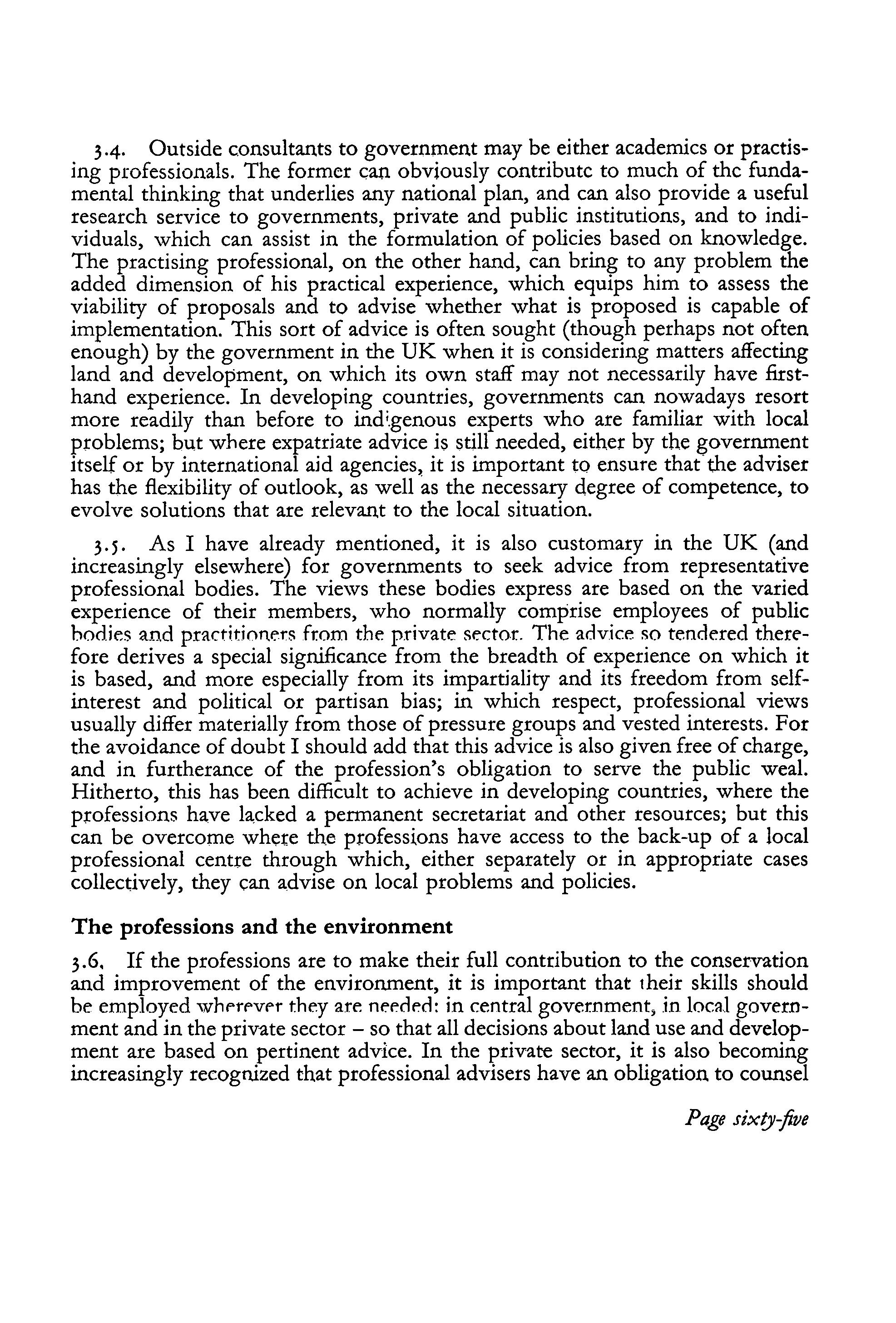
The professions and the environment
3.6, If the professions are to make their full contribution to the conservation and improvement of the environment, it is important that their skills should be employed wherever they are needed: in central government, in local government and in the private sector - so that all decisions about land use and development are based on pertinent advice. In the private sector, it is also becoming increasingly recognized that professional advisers have an obligation to counsel Page .cixtjv-five
their clients on the wider public aspects of conservation and development projects as well as on their personal and private interests. If the foregoing ends are to be served, the professions for their part must endeavour to ensure that their skills are available and are used wherever necessary. In support of this, they must ensure an adequate supply of manpower, and that their techniques for dealing with environmental problems are constantly advancing to meet new needs; which also means that they must find ways of inducing all practitioners to keep themselves up to date through midcareer training and in other ways. Universities, in collaboration with the professions, can obviously play an important part in the evolution and dissemination of new techniques, both through research and by the provision of mid-career courses. 3.8. The professional bodies are also becoming more active in expressing views on public environmental issues, such as the location of major airports, the routing of new motorways, policies for controlling urban traffic, the control of pollution, and policies for conservation - all of which involve both social and economic considerations and have an impact on the quality of the environment. As an example of this trend, the surveying profession in the UK has been asked by the Department of the Environment to help in determining policies for managing the urban fabric, with particular reference to the choice between redevelopment and the rehabilitation of existing urban areas. This is a matter which has, in fact, been engaging the attention of the profession for some time, because hitherto the choice has been strongly influenced by financial considerations, and more sophisticated techniques are needed in order to bring into account the aesthetic, historic and quality-of-life factors involved. Those professional institutions in the UK which are interested in conservation have also established a multi-disciplinary council to improve arrangements for the planning, management and development of natural resources and the built environment. This body has produced a number of publications dealing with conservation activities, derelict land, the countryside and multiple land-use, education for conservation, and other topics. These serve a dual purpose of arousing public interest in all aspects of conservation and of advancing techniques for dealing with conservation problems. 3.10. In an endeavour to promote good standards of conservation and development, several of the professions also make awards for outstanding achievements, such as - the annual awards by The Times and The Royal Institution of Chartered Surveyors for meritorious projects of conservation; and the awards by The Royal Institute of British Architects for good design.
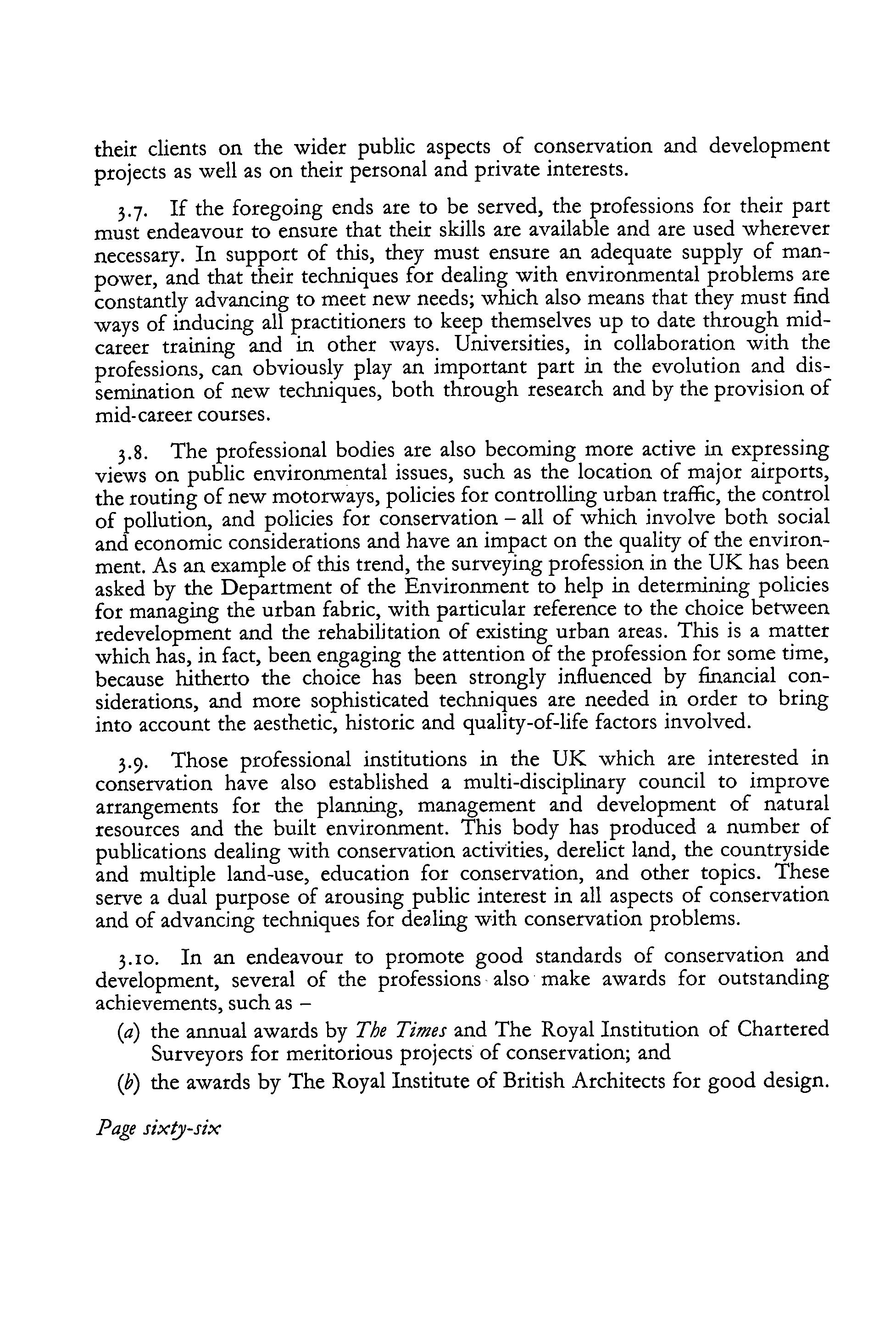
Page sixty-six
Legislation affecting land
3.11. The professions regularly advise the government and members of Parliament on proposals for land use legislation. Examples include - a critical review by The Royal Institution of Chartered Surveyors of the practical operation of the principal town and country planning legislation, which led to major amendment of its financial provisions; recurring studies of land use policies and the associated problems of compensation and betterment, which have been major issues in the UK for the past 30 years; a critical review of planning procedures and the arrangements for dealing with planning applications and appeals; comments on the practical effects of the recent proposal by government for taking into public ownership all land which is to be developed or redeveloped. 3.12. The professions also scrutinize legislation placed before Parliament which deals with property or development, and make proposals for improvement - based on their experience of the problems with which the legislation deals. Recent examples have included measures for regulating the relationships between landlords and tenants; the taxation of property, the taxation of development gains, and the taxation of wealth; and legislation laying down standards for the design and construction of buildings, protection against fire, and working conditions in buildings. 3.13. In the course of their work, the professions may also become aware of imperfections in the operation of existing legislation, and may themselves initiate proposals for amendment, which they submit to the government or to Parliament for consideration. Thus: (a) when rent controls were causing the progressive deterioration of controlled dwellings, proposals were made for amending the rent formula in such a way as to encourage repairs and maintenancc; and (b) when the basis of compensation for expropriation of property was causing hardship to certain dispossessed owners, proposals were again made for ameliorating the situation. In both cases, the proposals were adopted by the government and incorporated in new legislation. 3.14. Professional societies are also occasionally entrusted by statute with some function in connection with the administration of law. For example, the Lands Tribunal Act (which set up a Tribunal consisting of lawyers and surveyors to deal with compensation and other matters relating to land) requires the Lord Chancellor, when appointing any surveyor to the Tribunal, to consult first with the President of the RICS. There are also several statutes which require the President himself to appoint arbitrators in specified circumstances; and in

Page sixty-seven
addition he frequently makes appointments in private disputes where this procedure is agreed upon by the parties. 3.15. The professions work closely with the Law Commission in considering means of simplifying and codifying the law relating to property and development. They also give evidence to Royal Commissions and government committees appointed to study matters of public interest; and indeed it would be exceptional if any such body appointed to consider a problem affecting land did not also include one or more members from the professions conccrncd. They were also invited recently by the House of Commons Committee on Expenditure to comment on the current objectives of the new towns programme in the UK, the processes by which investment in the new towns is planned, the measures by which success in achieving objectives is assessed, and whether the new towns procedure could be used in other planning situations.
Building and development 3.16. The environmental professions are concerned with the construction industry, as well as with land use; and they again advise in a variety of ways. They are, for example, strongly represented on the National Consultative Committee for the Building and Civil Engineering Industries, which advises the Minister of Housing and Construction on matters of policy in the construction field; including particularly the work-load on the construction industries and any steps that need to be taken to reduce the load or to stimulate new development as the case might be. They are also represented on the National Economic Development Council for the Building Industry, through which they have been able to introduce several new concepts for improving the operations of the industry. The professions are well placed to tender advice on such matters because of their first-hand and widespread knowledge of the industry through the letting and management of building contracts. 3.17. The professions also seek to improve the efficiency of the industry by producing codes of practice and guidance on professional procedures. Most notable in this context, perhaps, is the Standard Method of Measurement for Building, which provides the basis for arriving at an equitable price for building works in the UK and elsewhere. The importance of this publication, which has been regularly up-dated to reflect current precepts and practice, may be gleaned from the fact that the two sponsoring bodies are currently investing L8o,000 in yet another fundamental review. 3.18. The RICS also operates a Building Cost Information Service which collects, processes and disseminates comprehensive information about current building costs, which is invaluable in many policy decisions. It has also recently established, in collaboration with the Department of the Environment, a
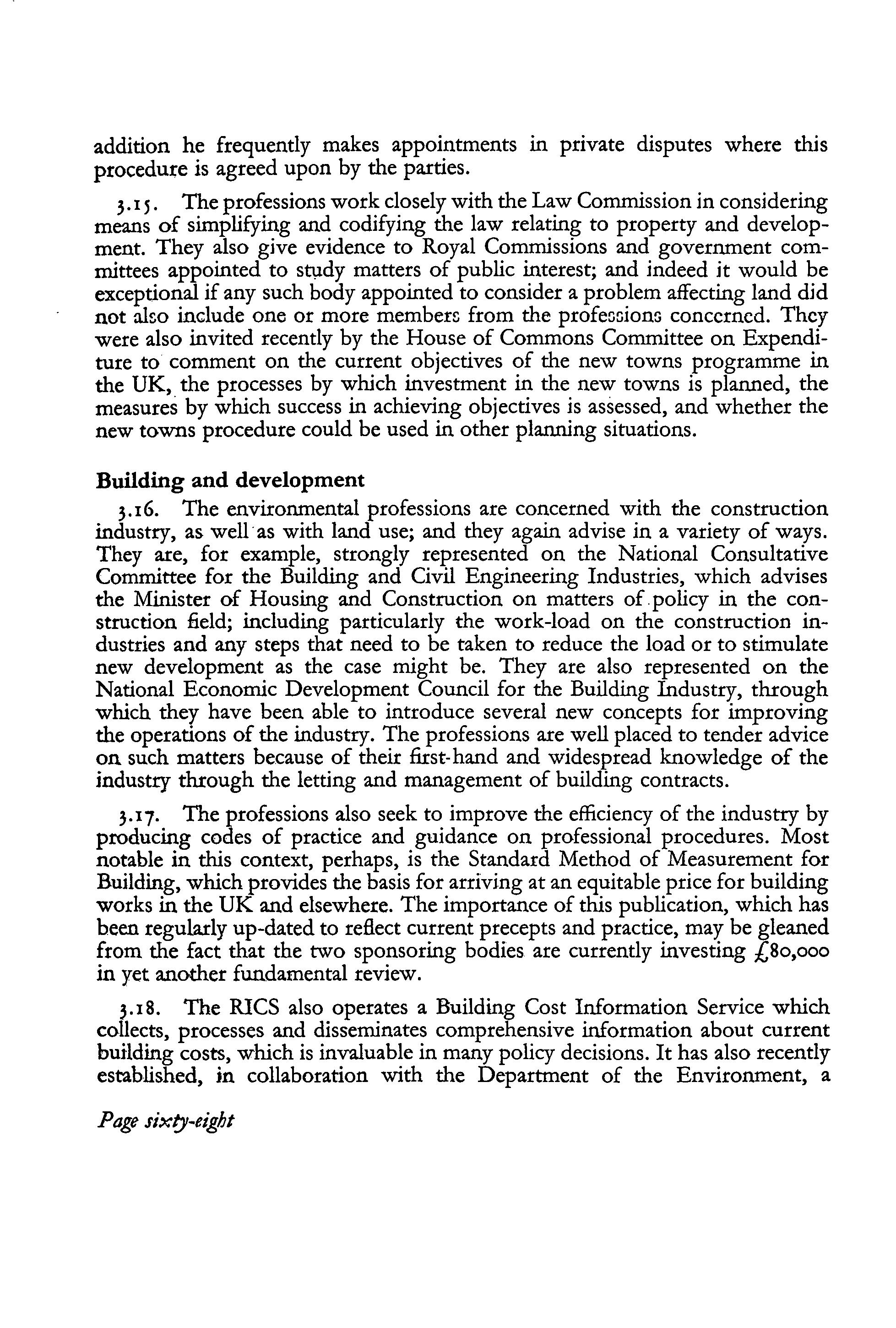
Page sixy-eight
similar service for Building Maintenance Costs. The Institution has also played a major part in sccking to improve the efficiency of the construction industries through the development of computer techniques and in other ways.
Examples of other consultative arrangements
3.19. The government and the professions have established liaison arrangements for advising on the requirements of map users, as a guide to the government in its national mapping programme. 3.20. The surveying profession has taken the initiative, in consultation with the government, the Stock Exchange and the Institute of Chartered Accountants, to lay down standards of practice for the valuation of company property assets. This was a matter on which some public disquiet had been expressed; the initiative taken by the profession has done a great deal to ensure that competent valuers are engaged for such work and to reassure the public that reliance can be placed on the valuations made.
4. THE PROFESSIONAL APPROACH 4.1. This brief review of relationships between the professions and the government brings me to the important question of the attitude of professional advisers to the political aspects of government policy. I have already explained that the environmental professions work in politically sensitive areas, in which it is important that they should proffer their advice with due political rectitude. It is not their purpose to engage in party political contention. Political decisions are taken by Parliaments or governments; and professions should aim to remain aloof from the political arena. In matters of legislation and public policy generally, the primary role of the professions is to offer objective advice, based on the expert knowledge and experience of their members. They may be required to comment on the consequences or practical operation of existing or proposed legislation; or to make constructive proposals for dealing with an existing state of affairs which is considered to be unsatisfactory; or in such a situation they may even initiate proposals themselves if the government has no evident plans of its own for dealing with the matter. They may also have a role to play in creating a climate of public opinion that will foster necessary change and facilitate action to bring it about. 4.2. A profession should, however, be careful not to go further and to argue for or against political views as such. The importance of this principle is particularly apparent in those countries where the democratic system is prone to produce successive governments of different political outlooks - for a
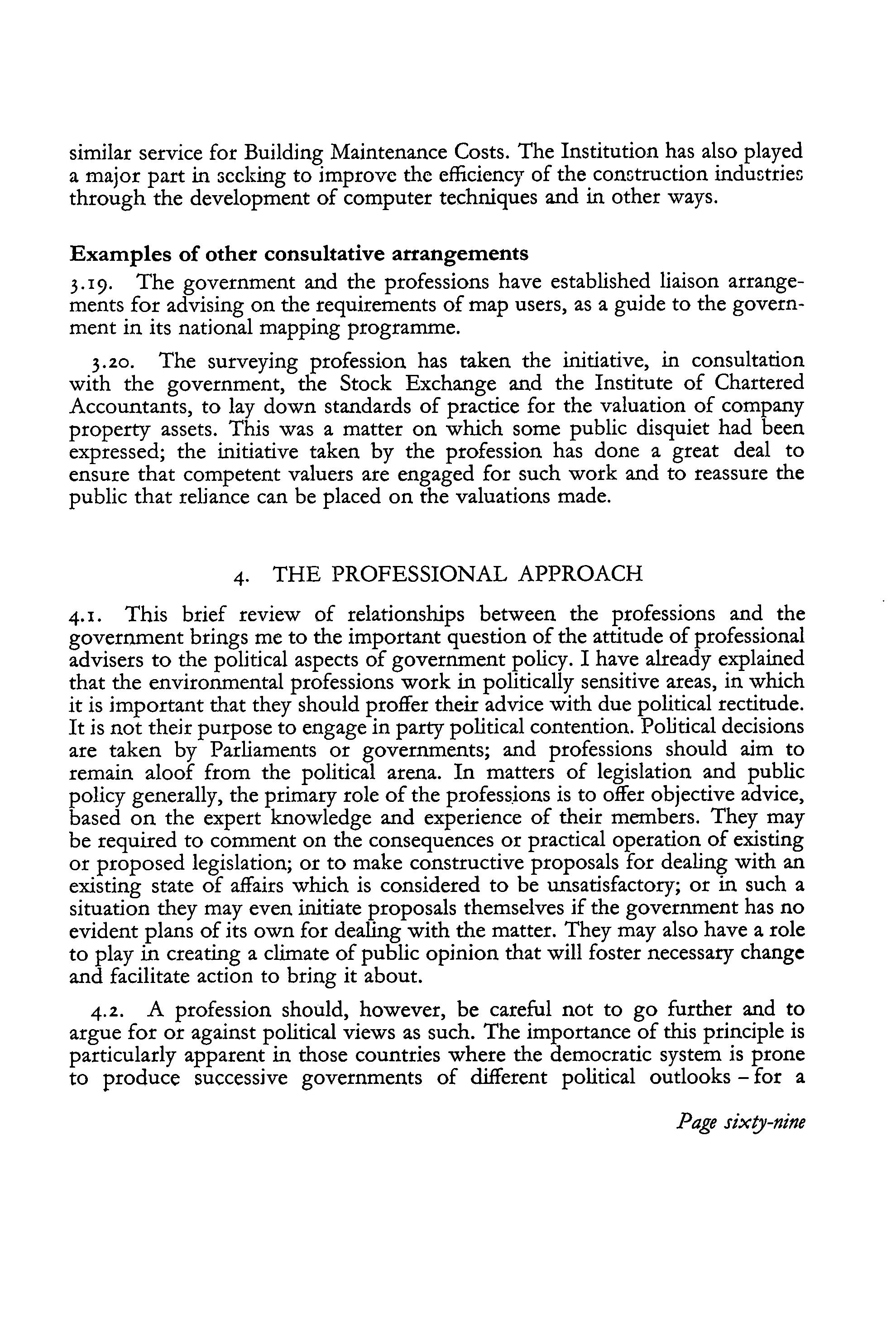
Page sixty-nine
profession must make its advice available, without fear or favour, to all who seek it. A profession which demonstrably became the liege of any one political party could not expect to carry conviction with any other party, and its service to the community as a whole would then be seriously diminished. 4.. The philosophy I am putting forward was admirably expressed, although in a very different context, by Bernard Shaw in 'Major Barbara' - in the passage where Cusins has agreed terms for entering the armament factory of Undershaft, his father-in-law: 'Barbara: Is the bargain closed Dolly? Does your soul belong to him now?
Cusins: No: the price is settled: that is all. The real tug of war is still to come.
What about the moral question?
Lay Britomart: There is no moral question in the matter at all Adolphus.
You must simply sell cannons and weapons to people whose cause is right and just, and refuse them to foreigners and criminals.
Undershaft (determinedly): No: none of that. You must keep the true faith of an Armourer, or you don't come in here.
Cusins: What on earth is the true faith of an Armourer?
Undershaft: To give arms to all men who offer an honest price for them, without respect of persons or principles: to aristocrat and republican, to
Nihilist and Tsar, to Capitalist and Socialist, to Protestant and Catholic, to burglar and policeman, to black man, white man and yellow man, to all sorts and conditions, all nationalities, all faiths, all follies, all causes and all crimes.' 4.4. The professions concerned with land do not make arms, but they must keep an analogous faith. Their concern is to achieve the best use of land, through its prudent conservation, management and development. But the application of their skills to that end takes place within a legal framework whose form will be fashioned by the political philosophies of governments on such matters as land ownership, land reform or the taxation of development gains. In a democracy, the political will of the electors must prevail; and once opinions are formed and policies are made, the role of the professions is to put those policies into operation whether or not they agree, as individuals, with the political philosophies on which policies are based. On the other hand, until that stage is reached, the professions are entitled - indeed they have a duty - to take all appropriate steps to ensure that, in coming to their decisions, both the public and the government are fully informed about the iss..ies involved and the likely consequences (technical, economic and social) of any course they seek to follow. Page seven*

SOME ESSENTIAL PREREQUISITES
. 5.'. If a profession is to play its full part, it must be alert to six essential needs - it must form and develop a strong and influential professional society, which can provide a focal point for its corporate activities; it must ensure that the profession covers the full range of activities in which its skills are needed; it must constantly foster the advancement of techniques and skills to ensure that these are adequate for dealing with the increasingly complex situations with which the profession will be confronted; it must ensure that the manpower resources of the profession are adequate to meet the demands for its services; it must maintain or cultivate an aptitude for giving advice that is objective and dispassionate, rather than subjective and emotive; and it must contribute to debates on matters of public interest on which its members are specially qualified to express an opinion. 5.2. A professional society can only expect to be strong and influential, if it represents all sectors of its profession and draws upon the experience of a representative range of its membership. High among its priorities will be the development of corporate skills and the attainment of high standards of conduct and integrity. By these means it can hope to raise the standing of the profession and command the respect of governments and the public in general. In such a climate, it is likely that the skills of the profession will be better understood and more widely used; and the public will be receptive to the corporate opinion which the profession may express on matters within its competence. The field of interest of a profession is never static. As I have indicated, . the frontiers of its knowledge are constantly advancing, and the application of that knowledge may require the development of new techniques or the refinement of existing ones. The profession must therefore adjust its horizons as necessary, and be alert to the need for new services within its compass. A notable example of this is the broadening interest of surveyors trained in land economy, whose original concern in the UK with the interests of individual landowners and the management of individual estates has widened to embrace, first, many aspects of land use planning, and more recently the even wider aspects of managing the environment as a whole. This evolutionary process does not occur simultaneously in all countries, and one of the advantages of pan-Commonwealth associations is that their work in the dissemination of knowledge and experience greatly accelerates the rate at which the professions in. the Commonwealth as a whole can now advance.
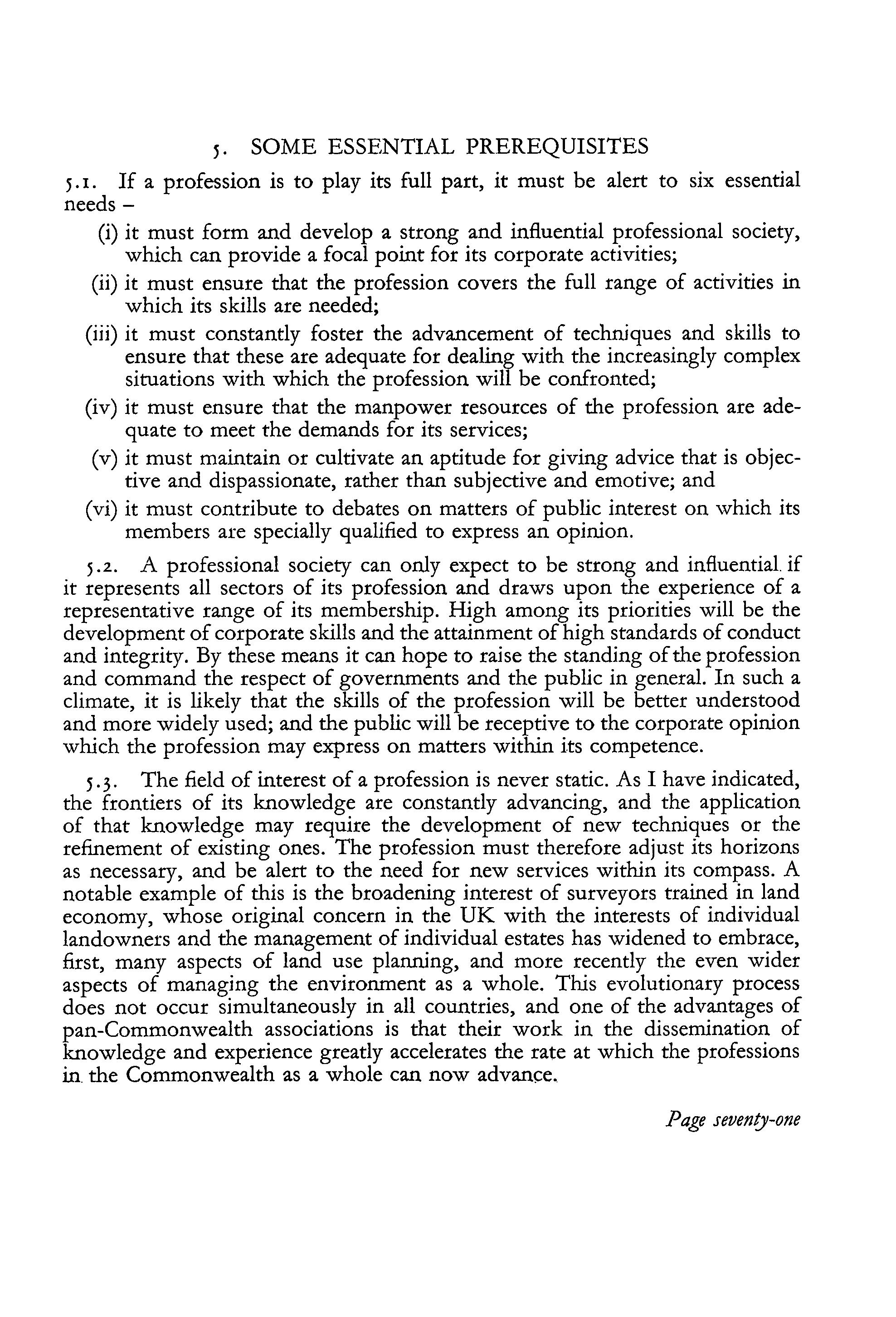
Page seventy-one






